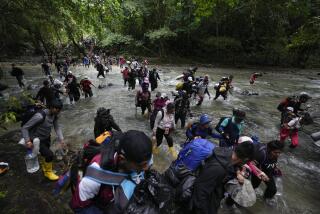U.S. Admits It Studied Options to Oust Noriega
- Share via
WASHINGTON — Senior Reagan Administration officials acknowledged Saturday that they have been considering a number of new options to bring about the ouster of Panamanian strongman Manuel A. Noriega, but they refused to discuss reports of possible U.S. military or covert action to remove him by force.
In Rome, Secretary of State George P. Shultz reminded reporters that the Pentagon is sending 1,300 additional troops to Panama, and then added: “Beyond that, we debate various policy options.
Basically, this is a question of a person who is no longer welcome in his own country.”
A senior White House official with President Reagan in Santa Barbara was similarly vague. “We have a range of options under consideration and evaluation, but I’m not going to say what’s going to happen next,” he said.
The Times reported in its Saturday editions that during a series of high-level meetings last week, Shultz urged President Reagan to order military or covert action against Gen. Noriega but that Secretary of Defense Frank C. Carlucci opposed these proposals as dangerous and ill-timed.
Shultz, Abrams Proposals
Shultz and Assistant Secretary of State Elliott Abrams were said to have proposed several different possibilities, including the use of the CIA to foster a military coup against Noriega or sending a special operations force to kidnap Noriega and bring him to the United States for trial. Noriega has been indicted by two federal grand juries in Florida on drug trafficking charges.
When questioned about The Times’ report, Shultz replied, “I never comment on speculative newspaper articles.” Asked specifically about the possibility that the United States might seek to remove Noriega by force, he said, “I don’t want to comment on options that may or may not be under consideration.”
White House spokesman Marlin Fitzwater asserted that the Reagan Administration has so far rejected the idea of using force against Noriega. However, Fitzwater carefully qualified all his statements with phrases such as “to this point,” leaving uncertainty about the future.
“There have been any number of offensive plans raised, but to this point, they have been rejected,” Fitzwater said. “ . . . Clearly, the decisions at this point have been limited to defensive (options).”
It remained unclear exactly why the Reagan Administration’s internal wrangling over whether to use force against Noriega has been carried out in such an open and public manner.
May Be Psychological Move
One possibility is that the frank discussion of the possible options is a psychological ploy aimed at unsettling Noriega and his supporters--much as the Reagan Administration sought in August, 1986, to rattle Libyan leader Moammar Kadafi by making him think the United States was on the verge of attacking him.
Another possibility is that the Administration’s public acknowledgment of options still in the discussion stage is meant to distract Noriega’s attention from the fact that some decision may already have been reached for a quick, surprise U.S. action against him.
The third possibility is that the debate has come out into the open because of unusually strong frictions between the State Department and the Pentagon. Several Washington officials active in Central America policy say they believe the dispute between Shultz and Carlucci during the past week was the culmination of a prolonged institutional dispute between the two agencies over what to do about Noriega.
Tells of Long Dispute
“This fight has been going on for several months,” said one official, who refused to be named. “The State Department tends to favor the use of force more than the people who have to do it. The only reason U.S. prestige is on the line with Noriega is that the State Department put it on the line. Now, they want the Pentagon to bail them out.”
The Pentagon announced Friday night that it would send 1,300 additional troops to Panama, beginning Tuesday, to increase security around the canal. On Saturday, some Administration officials stressed the point that nothing will happen in Panama at least until these troops arrive this week.
“These guys are going down there Tuesday, and there will be nothing between now and then,” one White House official said.
Former U.S. ambassador to Panama William J. Jorden said Saturday that he believes the dispatch of 1,300 troops could be viewed as “a prudent move, to give some Americans in Panama some confidence they won’t be attacked.” However, he said, the movement of these troops “is not necessarily related to the larger issue of what to do about Noriega.”
Gore Endorses Action
Democratic presidential candidate Albert Gore Jr. expressed general agreement Saturday with the Administration’s decision to send the new troops to Panama.
“With the instability and the large number of Americans who live there and the recent storming of a hotel in Panama City, I don’t think one can argue with the need to beef up security in a defensive move designed to protect our personnel there,” the Tennessee senator said.
Gore said he does not believe the dispatch of the troops has any “offensive or threatening implications.” He said he believes the United States should “ratchet up the pressure on Panama for the removal of Noriega.”
Times staff writers Norman Kempster in Rome, James Gerstenzang in Santa Barbara and Douglas Jehl in Washington contributed to this story.
More to Read
Sign up for Essential California
The most important California stories and recommendations in your inbox every morning.
You may occasionally receive promotional content from the Los Angeles Times.













